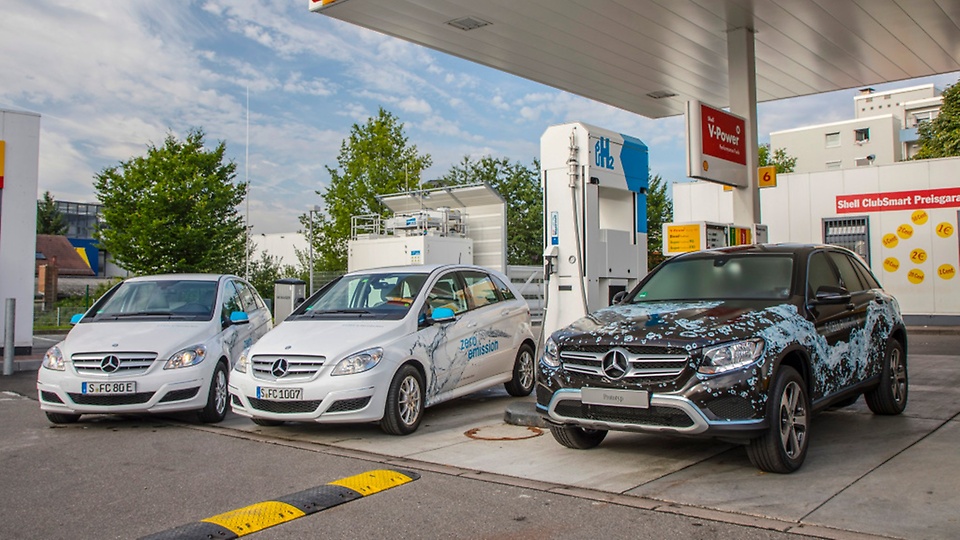
Hydrogen at the double! is the motto of several cities in Germany. With the new stations the hydrogen infrastructure is growing further to 52 locations in total.
 Joint venture H2 MOBILITY, comprising six industrial enterprises (Air Liquide, Daimler, Linde, OMV, Shell, Total) is launching the next stage of the process aimed at expanding the nationwide hydrogen refueling network to a total of 400 stations. The expansion of the nationwide H2 network is progressing well, with several sites officially opening in the last quarter of 2017: the H2 filling stations in Bad Rappenau and Bremen, at the Cologne/Bonn site, and in Munich. Since November in Koblenz the first station in Rhineland-Palatinate is open. The newest station is in Hirschberg.
Joint venture H2 MOBILITY, comprising six industrial enterprises (Air Liquide, Daimler, Linde, OMV, Shell, Total) is launching the next stage of the process aimed at expanding the nationwide hydrogen refueling network to a total of 400 stations. The expansion of the nationwide H2 network is progressing well, with several sites officially opening in the last quarter of 2017: the H2 filling stations in Bad Rappenau and Bremen, at the Cologne/Bonn site, and in Munich. Since November in Koblenz the first station in Rhineland-Palatinate is open. The newest station is in Hirschberg.
In total, 43 hydrogen refueling stations are set up.Other locations include Stuttgart, Geiselwind service station in Franconia and two stations in Berlin. The existing hydrogen refueling network reaches more than six million people in the Berlin, Hamburg, Rhine/Ruhr, Stuttgart and Munich regions.
Around two million euros for hydrogen infrastructure
Ensuring the success of hydrogen mobility requires the simultaneous provision of an attractive range of fuel-cell vehicles as well as the necessary fuelling infrastructure. The current hydrogen refuelling station in Germany are sponsored by the German government via its National Innovation Programme for Hydrogen and Fuel Cell Technology (NIP). Altogether, the German government contributed 1.8 million euros to the construction of the two new stations. By 2018, the plan is to have 100 filling stations. The Clean Energy Partnership (CEP) demonstration project laid the foundations for the expansion of Germany’s hydrogen infrastructure by establishing common standards and norms.
Stations with new technologies CO₂
The two latest hydrogen stations in Baden-Württemberg feature state-of-the-art technology and an intuitive fuelling experience for drivers, similar to refuelling conventional vehicles. The refuelling process takes between three and five minutes to complete. Sindelfingen and Pforzheim each have the capacity to serve 40 hydrogen-powered cars per day from now on.
Environmental friendly driving
A hydrogen-powered fuel-cell vehicle emits no local pollutants or carbon dioxide (CO₂). A number of manufacturers already offer such vehicles, with an operating range of between 500 and 700 kilometres. At the IAA International Motor Show Daimler presented the preproduction models of the new Mercedes-Benz GLC F-Cell . A world first, the vehicle is set to combine innovative fuel-cell and battery technology in the form of a plug-in hybrid and will be produced in the Mercedes-Benz plant Bremen.
Peter Theurer, manager of the Mercedes-Benz plant Bremen said, “At the IAA, Mercedes-Benz unveiled pre-production models of the new GLC F-CELL. We are delighted that this electric vehicle, the world's first with fuel-cell and battery propulsion, will be built in Bremen. Our team is already in the starting gate. Together with our partners at H2 Mobility, we are also working intensively on establishing and expanding the nationwide network of H2 filling stations, and can therefore offer our customers a real alternative for emissions-free mobility in Germany in future.”
Hydrogen plays an important role in the debate on how Germany can achieve its climate goals. It is one of the options for extending the fuel supply in the transport sector in a climate-friendly manner, because climate-damaging CO2 emissions can be significantly reduced by using hydrogen generated produced with renewable energy.
More information: h2-mobility.de
Source: Daimler
Read the most up to date Fuel Cell and Hydrogen Industry news at FuelCellsWorks




